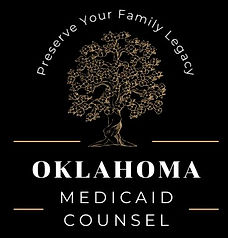Frequently Asked Questions (FAQ)
1. What is Medicaid long-term care in Oklahoma?
Oklahoma Medicaid, also known as SoonerCare, helps qualified individuals pay for long-term care services, including nursing home care, in-home care, and some assisted living. These benefits are available to individuals who meet both medical and financial eligibility requirements.
2. Who qualifies for long-term care Medicaid in Oklahoma?
To qualify, you must:
-
Be a U.S. citizen or legal resident
-
Be medically eligible for nursing home-level care
-
Meet financial limits:
-
Income limit: Around $2,901/month (2025, for an individual)
-
Asset limit: $2,000 in countable resources
-
If you're over these limits, Medicaid planning strategies may still allow you to qualify legally and ethically.
3. Can I keep my home and still qualify for Medicaid in Oklahoma?
Yes. In most cases, your primary residence is exempt if:
-
You or your spouse lives in it
-
You intend to return home
-
Its equity is under a certain cap (around $730,000 in 2025)
However, Oklahoma may pursue estate recovery against your home and probate property after your death to recoup costs, so planning ahead is essential.
4. What is the 5-year look-back period?
When you apply for Medicaid, the state reviews financial transactions from the past 60 months (5 years) to see if you’ve transferred assets for less than fair market value. If so, you will face a penalty period—meaning you’ll have to pay out of pocket for a certain amount of time.
5. Is it too late to get help if my loved one is already in a nursing home?
No—it’s not too late. Even after someone is admitted to a facility, there are crisis-planning strategies that can help protect significant assets and qualify for Medicaid more quickly. The sooner you reach out, the more options you may have and the more assets can be preserved.
6. What is a Medicaid spend-down in Oklahoma?
A spend-down involves reducing your countable assets to meet Medicaid limits. It must be done legally and carefully to avoid penalties. Examples include:
-
Paying off debts
-
Making home improvements
-
Purchasing exempt items (e.g., burial plans)
7. How are retirement accounts treated for Oklahoma Medicaid?
-
If you're taking required minimum distributions (RMDs): The account will be treated as an asset for its current value, and in addition, the distributions will be counted as income.
-
If you're not taking RMDs or it's a Roth IRA: The full value of the account will be counted against you.
These rules are complex—professional guidance is strongly recommended.
8. What happens to my spouse if I go on Medicaid?
Oklahoma follows federal spousal impoverishment rules, which protect the healthy spouse (called the “community spouse”) from losing everything. In 2025, the community spouse can usually keep up to half of the couple’s assets, up to $157,920, and is entitled to a portion of the couple’s monthly income.
Legal planning techniques can increase both of these amounts beyond what is written in the Medicaid regulations. Married couples should always seek legal help for the best financial outcome.
9. What legal tools are used in Medicaid planning?
Depending on your needs, we may use:
-
Irrevocable Medicaid Asset Protection Trusts (MAPTs)
-
Qualified Income Trusts (Miller Trusts, required if income exceeds limits)
-
Caregiver contracts
-
Spousal transfers and planning
-
Medicaid-compliant annuities
Most of the Medicaid legal tools we use are not contained in the Medicaid regulations directly, but have been developed through Medicaid litigation in Oklahoma and other states and are now accepted as legal options.
10. I already did a trust. Doesn’t that protect me?
Many people create trusts for estate planning. These are commonly known as revocable trusts or “living trusts.” And they work great as a tool to avoid probate. However, they do not work to protect assets under the Medicaid rules.
Trusts can be useful to protect your assets from Medicaid, but only if the trust was properly designed specifically for that purpose. <video link>
11. How much do Medicaid planning services cost?
Fees depend on the complexity of your situation. Pre-planning is less expensive. Crisis planning usually costs the equivalent of one to two months of nursing home care. In addition, our fees are guaranteed – if we don’t do what we say we will, we will refund the fee to you.
We offer free consultations to explain your options. In almost every case, the assets and income we help protect far outweigh the cost of legal planning.
We’re Here to Help Oklahoma Families
Whether you're planning ahead or in the middle of a care crisis, we can help guide you through the Medicaid process with confidence and compassion.
